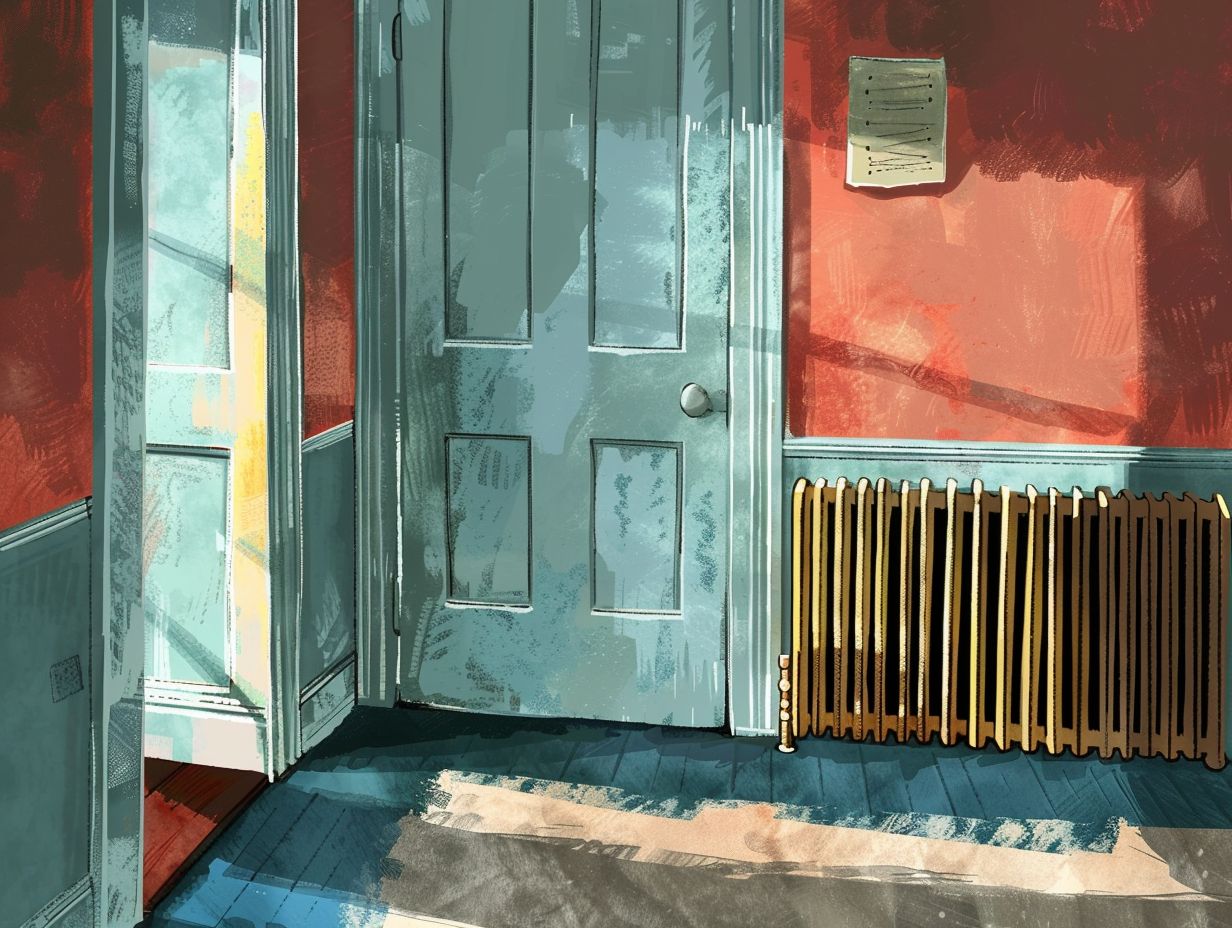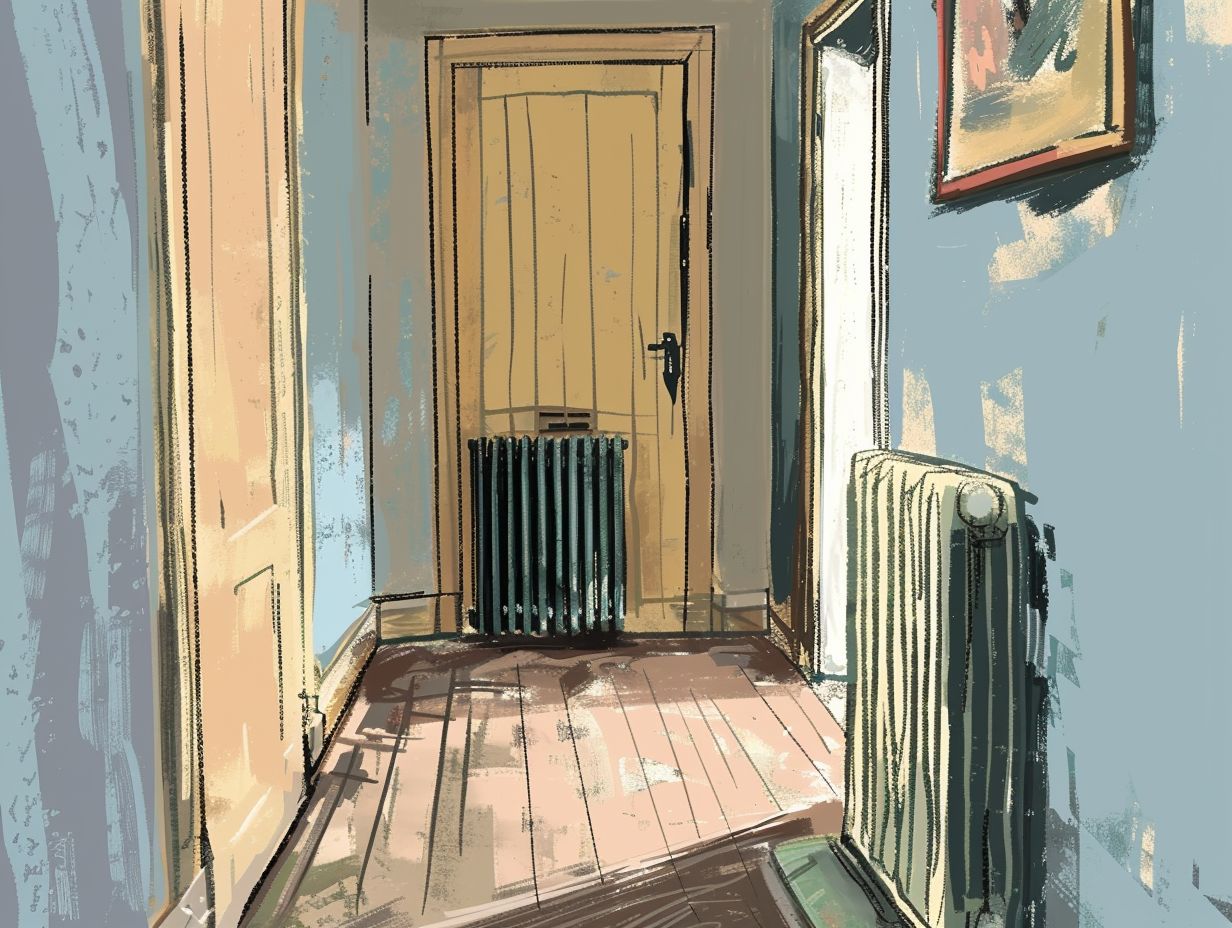Have you ever walked into your hallway and noticed that the radiator is hot when the heating is off? This article will explore the inner workings of radiators and heating systems to help you understand why this might be happening.
From thermostat settings to trapped air in the system, we will discuss the possible causes of a hot hallway radiator. Learn how you can fix this issue, whether it’s by bleeding the radiator, adjusting the thermostat, or calling in a professional for assistance.
Key Takeaways:

- Check thermostat settings before assuming a malfunction – it may have accidentally been left on or set too high.
- Air trapped in the heating system can cause radiators to stay hot even when the heating is off. Bleeding the radiators can help release this trapped air.
- If adjusting the thermostat and bleeding the radiator doesn’t fix the issue, it may be time to call a professional to check for any malfunctions in the heating system.
Possible Causes of a Hot Hallway Radiator

To identify the reasons behind a hot hallway radiator when the heating is off, you should start by examining potential issues with the thermostat, radiator valves, or underlying system faults. It is also important to understand heating trends to gain insights into this anomaly.
If the thermostat malfunctions, it may incorrectly signal the radiator to heat up even when the system is supposed to be off. Similarly, valve problems can disrupt the regulation of hot water flowing into the radiator, causing it to remain hot.
Broader heating trends, such as imbalanced pressure within the system or improper insulation, can lead to irregular heating patterns that present as a hot radiator in a hallway. By investigating these common causes, homeowners can effectively address the issue and restore the proper functioning of their heating system.
Thermostat Settings
Improper thermostat settings may cause a radiator to become excessively hot, even when the heating system is turned off. It is imperative to effectively manage the thermostat to uphold a comfortable and energy-efficient temperature within the room.
This practice is not only essential for ensuring the comfort of the occupants but also for preventing energy wastage. When a radiator overheats due to incorrect thermostat settings, it can lead to discomfort and uneven heating throughout the room. Inadequate management of heating can also result in elevated energy costs and unnecessary strain on the heating system.
By adjusting the thermostat to the appropriate level, you can achieve a well-balanced indoor temperature that fosters a warm and inviting atmosphere while optimising energy consumption.
Air Trapped in the System
Air trapped within your heating system can disrupt the balance of heating, causing certain radiators to retain heat even when the system is turned off. To address this issue, it is important to bleed the radiators to release any trapped air and restore proper heating equilibrium.
The presence of trapped air in your heating system creates bubbles that impede the flow of hot water, hindering efficient heat distribution. This can result in rooms failing to reach their desired temperature, leading to discomfort.
Bleeding the radiators is essential to eliminate these air pockets, allowing hot water to circulate smoothly and evenly distribute heat throughout the system. This routine maintenance task is critical for optimising the performance of your heating system.
Proper bleeding ensures that your thermostat controls can accurately assess room temperature, enabling more precise and energy-efficient heating adjustments.
Thermostat Malfunction
You need to address thermostat issues promptly to prevent energy wastage and system faults that may arise from a malfunctioning thermostat causing radiators to get hot unexpectedly, even when the heating is off.
Besides the energy inefficiency linked to a malfunctioning thermostat, there is a risk of overheating within the heating system. The unexpected heating of radiators can create uneven temperatures throughout your house, leading to discomfort and potential damage to system components.
Continuous operation of the heating system due to inaccurate thermostat readings can result in premature wear and tear, increasing the likelihood of malfunctions and costly repairs. Therefore, regular maintenance and timely repair of thermostats are crucial to ensuring efficient heating operation and optimal energy utilisation.
How to Fix a Hot Hallway Radiator When Heating is Off?

When addressing a hot hallway radiator issue whilst the heating system is turned off, practical steps such as bleeding the radiator to release trapped air or adjusting the thermostat settings may be necessary. If these initial actions do not resolve the problem, seeking assistance from a professional heating engineer is recommended.
If bleeding the radiator or adjusting the thermostat fails to alleviate the issue, it is important to consider other potential factors. Check for any blockages in the radiator valves or pipes that could be impeding proper circulation. Additionally, ensure that all hot water taps are closed to prevent air from entering the system.
Should the problem persist despite these efforts, it is advisable to contact a heating specialist. A professional inspection can identify and address any underlying issues with the heating system to ensure a warm and comfortable home environment is maintained.
Bleeding the Radiator
When bleeding a radiator, you will need to release trapped air from the system using a radiator key to open the bleed valve. This process is essential to allow hot water to flow smoothly through the radiator, ensuring effective heat distribution.
To get started with bleeding a radiator, it is crucial to first turn off the heating system to prevent any potential burns or accidents. After turning off the system, you should locate the bleed valve on the radiator, typically situated at the top.
Insert the radiator key into the valve and slowly turn it in an anti-clockwise direction. As you do this, you will hear a hissing sound as the air escapes. It is important to keep a container nearby to catch any water that may leak out.
Once all the trapped air has been released, tighten the valve to stop the water flow and check for any leaks. Additionally, remember to monitor the pressure gauge on the boiler and top up if necessary to maintain optimal heating efficiency.
Adjusting the Thermostat
Adjust the thermostat to a lower setting when the heating is off to help regulate the temperature of the radiator and prevent overheating. Proper control of the thermostat is crucial for maintaining a comfortable indoor climate.
This simple adjustment not only prevents the radiator from becoming too hot but also plays a vital role in ensuring that your home remains cosy without unnecessary energy consumption. By lowering the thermostat, you effectively balance the heat distribution, which is essential for optimising your heating system’s efficiency.
Remember, maintaining a consistent temperature not only enhances comfort but also aids in reducing energy bills. It’s a minor change that can have a significant impact on creating a warm, energy-efficient environment.
Calling a Professional
When DIY solutions prove ineffective in resolving a hot radiator issue, it is recommended that you seek the expertise of a professional heating engineer. These professionals have the capability to diagnose and rectify system faults that may be contributing to the problem.
Heating engineers possess the necessary knowledge and experience to accurately identify the underlying causes of heating system malfunctions. Through comprehensive assessments, they can determine whether the issues are stemming from faulty valves, airlocks, pump failures, or other intricate components.
These professionals are equipped with specialised tools and techniques to effectively repair or replace damaged parts, ensuring the optimal functionality of the entire heating system. Seeking professional assistance not only guarantees the timely resolution of heating problems but also improves the overall safety and performance of your heating setup.
Frequently Asked Questions

Why is my hallway radiator hot when the heating is off?
There could be a number of reasons why your hallway radiator is still hot when the heating is off. Some possible causes could be a malfunctioning thermostat, a leak in the heating system, or air trapped in the pipes.
How do I troubleshoot a hot hallway radiator when the heating is off?
If your hallway radiator is still hot when the heating is off, you can troubleshoot the issue by checking the thermostat, examining the heating system for leaks, and bleeding the radiator to remove any trapped air.
Is it normal for a hallway radiator to be hot when the heating is off?
No, it is not normal for a hallway radiator to be hot when the heating is off. This could be a sign of a problem with your heating system and should be addressed to prevent further damage.
Can a hot hallway radiator be a fire hazard?
In most cases, a hot hallway radiator when the heating is off is not a fire hazard. However, if the radiator is extremely hot and emitting a burning smell, it could indicate an electrical issue and you should turn off the heating system and contact a professional.
What should I do if my hallway radiator is still hot when the heating is off?
If your hallway radiator is still hot when the heating is off, you should first check the thermostat and heating system for any issues. If you are unable to find the cause of the problem, it is best to contact a heating professional for assistance.
How can I prevent my hallway radiator from being hot when the heating is off in the future?
To prevent your hallway radiator from being hot when the heating is off in the future, it is important to properly maintain your heating system. This includes regularly checking for leaks, bleeding radiators to remove trapped air, and having your system serviced by a professional if needed.

